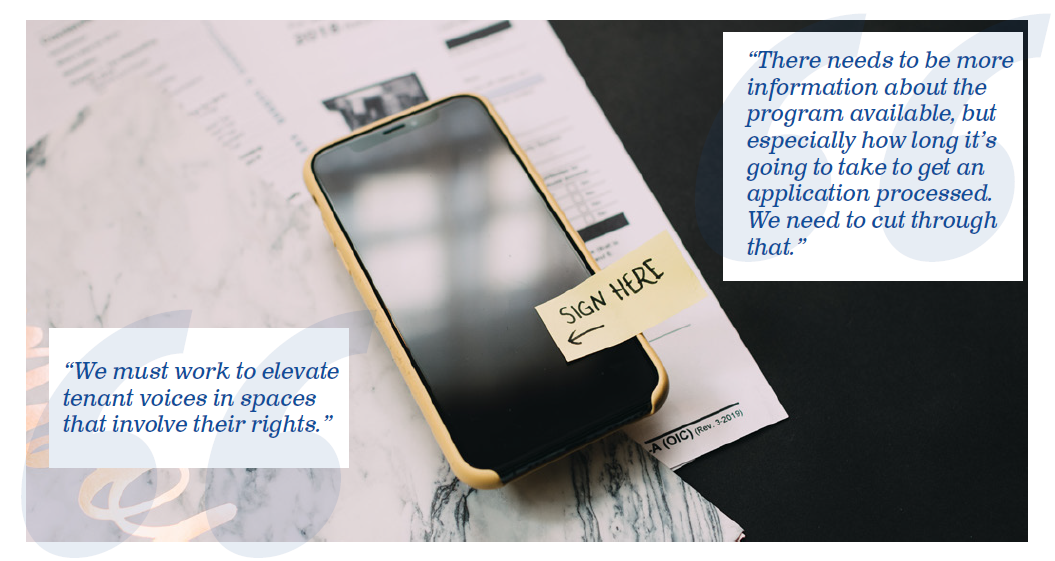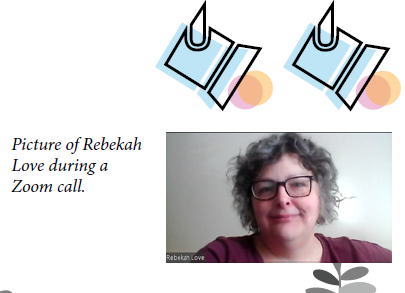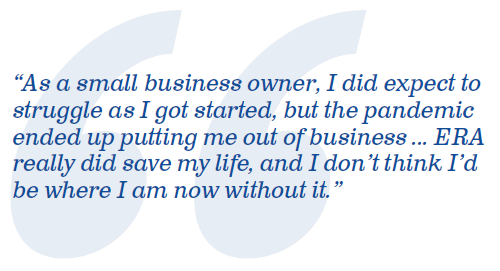My Experience with ERA – A Renter’s Perspective
by Anonymous Renter in Pittsburgh, Pennsylvania
My experience applying for Emergency Rental Assistance (ERA) was my first time seeking out this type of assistance. I had recently quit my job due to the pandemic. Before quitting, my husband and I were on a fixed income. When I lost my job, my family did not have enough money to meet the rent. We started having a lot of rental arrears. I decided to apply for ERA but faced multiple barriers with the application itself that made the process a bit tedious. I am not a person that is used to being online. Truth be told, when the pandemic began, my daughter got accustomed to being online faster than I did because she had to go to school remotely. Sometimes my daughter would help me navigate the online world. I would still get stressed trying to access the online application, especially because the application itself was so long and unorganized. I ended up having to go into the application multiple times because it would ask for information that I would have to look for. I also have arthritis, and it’s hard to be on the computer all the time. Having a medical condition does not make this process easier. The estimated time an application takes to get approved always varies, which can be difficult for some families, including my own. I have heard of some individuals reapplying after not hearing back about their application status, but that only makes it harder for their initial application to be processed. There needs to be more information about the program available, but especially how long it’s going to take to get an application processed. We need to cut through that.
The wonderful women at Hill District Census Group provided me with a lot of support. I would not have received my rental assistance without them. Community groups like the Hill District Census Group are important because they help applicants who are not tech-savvy access online applications. They also help address the concerns of applicants who are stuck in the “middle” waiting for their application to be approved. They helped me get my materials together, like bills, paperwork, and personal information, which would have taken so much longer without them. Not to mention that they can communicate with landlords who may be hesitant to participate in the program. It’s not easy, but once landlords understand ERA and get on board with it, it makes the application process easier. With the assistance of community groups, individuals can avoid moving out of their unit because they do not hear back about their application. The entire ERA program is a new process for tenants, and these community groups help tenants understand the applications and guidelines of the program. If you’re a go-getter, it’s good, but if not, you’re missing out. Not everyone is going to seek out help the way I did, so it’s important to make sure these resources are available to everyone.

In the future, I suggest that policymakers at all levels of government engage tenants before creating a program with such a rigorous application process. Programs will vary and have different components to them depending on the location, but it can be difficult to implement an effective rent assistance program when tenants are not given a voice. We must work to elevate tenant voices in spaces that involve their rights. The ERA program started as well-intentioned, and it could be a wonderful program if more community resources were available. Renters will shy away from an ERA program because of the intimidating application process. Programs should aim to streamline their applications or provide renters with community resources, such as those at the Hill District Census Group, to help tenants apply for rental assistance. As someone who has worked hard all her life, just to ask for assistance now, I hope ERA programs will continue to improve.
Rental Assistance Can Be a Lifesaver
by Rebekah Love, Renter from Louisville, Kentucky
 Poverty is not a new experience for me. Growing up, my parents were almost always renters, and they were too proud to utilize safety net programs to keep our family afloat. As a kid, I changed schools a lot, because we moved frequently. Basically, when rent was due and they couldn’t pay, we would pack what we could and leave in a rush, because they were too ashamed and afraid to face the landlord. As a result, I went to over a dozen public schools between kindergarten and Seventh Grade. When I finished high school, I went on to college, where, with the help of Pell Grants and student loans, I received a degree in fine arts. After that, I went into a career in programming. This career was the way that I “lifted myself up by the bootstraps.” I had burnt out after 20 years, however. Leaving my technology career behind, I decided to do something I had always wanted to do – open a ceramics studio. As a small business owner, I did expect to struggle as I got started, but the pandemic ended up putting me out of business during that historic weekend of March 14-15, 2020. As unfortunate as my circumstances were, there was a lot to be grateful for. I ended up receiving unemployment assistance during a good portion of the pandemic, made available to those like me who were self-employed, via Pandemic Unemployment Assistance (PUA). When the unemployment support ended and as I slowly started to run out of money to pay for rent, the Louisville ERA program came to the rescue.
Poverty is not a new experience for me. Growing up, my parents were almost always renters, and they were too proud to utilize safety net programs to keep our family afloat. As a kid, I changed schools a lot, because we moved frequently. Basically, when rent was due and they couldn’t pay, we would pack what we could and leave in a rush, because they were too ashamed and afraid to face the landlord. As a result, I went to over a dozen public schools between kindergarten and Seventh Grade. When I finished high school, I went on to college, where, with the help of Pell Grants and student loans, I received a degree in fine arts. After that, I went into a career in programming. This career was the way that I “lifted myself up by the bootstraps.” I had burnt out after 20 years, however. Leaving my technology career behind, I decided to do something I had always wanted to do – open a ceramics studio. As a small business owner, I did expect to struggle as I got started, but the pandemic ended up putting me out of business during that historic weekend of March 14-15, 2020. As unfortunate as my circumstances were, there was a lot to be grateful for. I ended up receiving unemployment assistance during a good portion of the pandemic, made available to those like me who were self-employed, via Pandemic Unemployment Assistance (PUA). When the unemployment support ended and as I slowly started to run out of money to pay for rent, the Louisville ERA program came to the rescue.
A website was set up at stopmyeviction.org for renters in Louisville. After filling out the simple form online, I submitted my information, which was routed to an intake coordinator, who reached out to me and took over the entire application process once I provided her with the necessary documentation. She even connected directly with my landlord to facilitate that side as well. I wish my intake coordinator had touched base with me more often, but I understand that she and her organization were busy!
I needed rental assistance more than once during the pandemic. The second time, my lease was coming to an end, and my landlord would not renew it because of my previous participation in the program. My landlord also would not cooperate with my case manager the second time. There was a significant delay processing the payment. Meanwhile, I was facing homelessness, and the stress of the whole pandemic came crashing down on me and sent me to a crisis stabilization unit at a local mental health provider. There, I was hooked up with a case manager who helped me face the challenge with her experience and resources. I moved everything into storage and ended up staying at my aunt’s house because I didn’t have anywhere else to stay. It was only by sheer persistence that I secured a subsidized apartment for myself and my teenage daughter. I was with my aunt for two months, and right when I needed it, the rental assistance was there, helping me get rehoused.
When I did finally receive my rental assistance, it was provided to me with the stipulation that I would only use it for housing. It was confusing to me and my case manager what exactly that meant – “ONLY for housing.” For example, would I be able to use it to buy replacements for furniture that didn’t survive the move? The lack of guidance from the Department of the Treasury at the time did make it difficult for individuals like my case manager to determine whether I could use the funds for furniture. Due to this confusion, I did not receive the furniture I needed at that time, but I was thankful to have at least my rental debt paid off and a comfortable, safe home for my daughter.
ERA really did save my life, and I don’t think I’d be where I am now without it. The program is helpful for people who fall through the cracks. Before I was able to receive assistance, I had to face those monsters, Poverty and Homelessness, that I knew from childhood. I never wanted my daughter to have to experience that, and thankfully it was short-lived. For my fellow renters, I know how frustrating it can be to seek help. There is some shame that comes with asking for help. I myself had to navigate my feelings of self-worth as I navigated the ERA program. I want to let everyone who is experiencing homelessness or who is at risk of losing their home know: you are worthy of being helped! ERA and other programs were created to help you. Do not be afraid to get help. Don’t take “no” for an answer when you seek help. Follow up with people as often as you need to. Call them again. Know your rights. Contact your local Office of Ombudsman if you have one. Mostly, it’s important to understand how a case manager can help you. Their job is to be there for you, so take advantage of that when you can. You are not alone.
